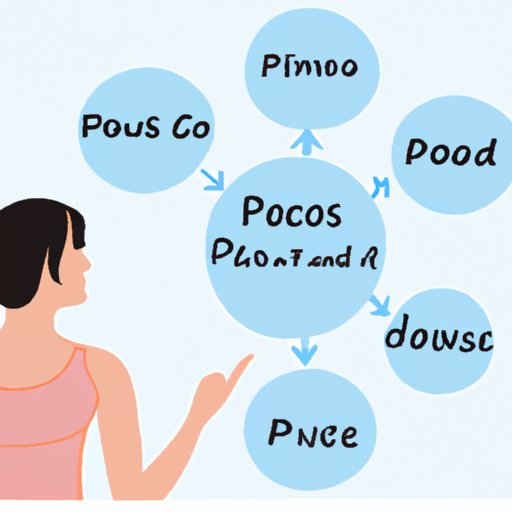Introduction
Polycystic ovary syndrome (PCOS) is a hormonal disorder that affects up to 10% of women of reproductive age. It is characterized by irregular menstrual cycles, high levels of male hormones (androgens), and polycystic ovaries. Symptoms can include acne, weight gain, infertility, and hirsutism (excessive hair growth).
While there is no cure for PCOS, making lifestyle changes can help manage symptoms. One of the most effective strategies is following a PCOS-friendly diet. In this article, we’ll explore the benefits of a PCOS diet, the basics of a healthy eating plan, and meal planning ideas for people with PCOS.
Exploring the Benefits of a PCOS Diet
Making dietary changes can have a significant impact on PCOS symptoms. Here are some of the key benefits of a PCOS-friendly diet:
Lowering Inflammation
Inflammation is a major factor in PCOS. Research has found that women with PCOS have higher levels of inflammation markers than those without the condition. Research also suggests that following an anti-inflammatory diet may help reduce inflammation and improve PCOS symptoms.
Reducing Insulin Levels
Insulin resistance is common in women with PCOS. This means the body doesn’t respond properly to insulin, leading to higher levels of circulating glucose in the blood. High levels of insulin can cause an increase in androgen production, which can worsen PCOS symptoms. Eating a low-glycemic diet can help reduce insulin levels and improve symptoms.
Balancing Hormones
Eating a balanced diet can help keep hormones in check. Foods rich in fiber, healthy fats, and antioxidants can help regulate hormone levels and improve PCOS symptoms.
The Basics of a PCOS-Friendly Diet
A PCOS-friendly diet should focus on whole, unprocessed foods that are low in sugar and refined carbs. Here are some of the key elements of a healthy eating plan for women with PCOS:
Eating Whole, Unprocessed Foods
Choose fresh fruits and vegetables, lean proteins, and whole grains whenever possible. Avoid processed foods, which often contain added sugars, unhealthy fats, and artificial ingredients. Aim to fill half your plate with non-starchy vegetables at each meal.
Avoiding Refined Carbs and Sugars
Refined carbohydrates and added sugars can cause spikes in blood sugar and insulin levels. To keep blood sugar levels stable, limit foods like white bread, pasta, pastries, candy, and sugary drinks. Choose complex carbohydrates such as quinoa, brown rice, and sweet potatoes instead.
Including Healthy Fats
Healthy fats can help balance hormones and reduce inflammation. Include foods like avocados, nuts, and seeds in your diet. Olive oil, coconut oil, and sesame oil are also good sources of healthy fats.
Eating Enough Protein
Protein helps keep you feeling full and can help regulate blood sugar levels. Aim to include a source of protein in every meal. Good sources of protein include fish, eggs, beans, lentils, and tofu.

Healthy Eating Tips for Women with PCOS
Here are some additional tips for eating a PCOS-friendly diet:
Eating Regularly
Skipping meals can lead to spikes in blood sugar levels. Eating regular meals and snacks can help keep blood sugar levels steady. Try to eat something every 3-4 hours throughout the day.
Getting Enough Fiber
Fiber helps keep you feeling full and can help regulate blood sugar levels. Aim to get 25-30 grams of fiber per day from sources like fruits, vegetables, legumes, and whole grains.
Eating Foods Rich in Omega-3s
Omega-3 fatty acids can help reduce inflammation. Good sources of omega-3s include salmon, tuna, walnuts, flaxseeds, and chia seeds.

An Overview of Foods to Avoid on a PCOS Diet
In addition to eating more nutritious foods, it’s important to avoid certain foods on a PCOS diet. Here are some of the foods to limit or avoid:
Processed Foods
Processed foods are high in sugar, unhealthy fats, and sodium. They can also contain artificial ingredients. Avoid packaged snacks, frozen meals, and other processed foods.
Trans Fats
Trans fats are found in processed foods and can increase inflammation and insulin resistance. Avoid foods that contain partially hydrogenated oils.
Refined Grains
Refined grains are stripped of their nutrients and can cause spikes in blood sugar. Limit foods like white bread, white rice, and other refined grains.

Meal Planning Ideas for People with PCOS
Meal planning can help make it easier to stick to a healthy eating plan. Here are some tips for meal planning for people with PCOS:
Focus on Nutrient-Dense Foods
Choose foods that provide the most nutrition per calorie. Focus on fruits, vegetables, lean proteins, whole grains, and healthy fats.
Prepare Meals Ahead of Time
Preparing meals ahead of time can help you stay on track. Cook large batches of food on the weekends and freeze them for easy weekday meals.
Incorporate Variety
Make sure to include a variety of foods in your diet. Eating the same foods every day can make it harder to stick to a PCOS-friendly diet.
Conclusion
Following a PCOS-friendly diet can help reduce inflammation, lower insulin levels, and balance hormones. The key is to focus on whole, unprocessed foods and limit refined carbs and added sugars. Meal planning can also make it easier to stick to a healthy eating plan. With a little bit of effort, you can make dietary changes that will help manage your PCOS symptoms.
(Note: Is this article not meeting your expectations? Do you have knowledge or insights to share? Unlock new opportunities and expand your reach by joining our authors team. Click Registration to join us and share your expertise with our readers.)
